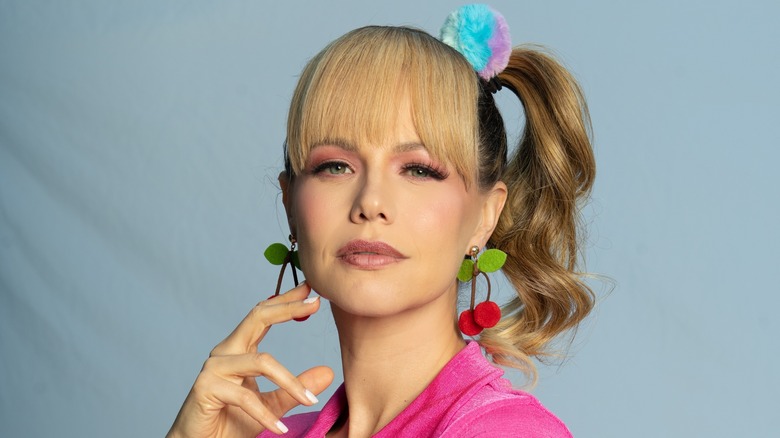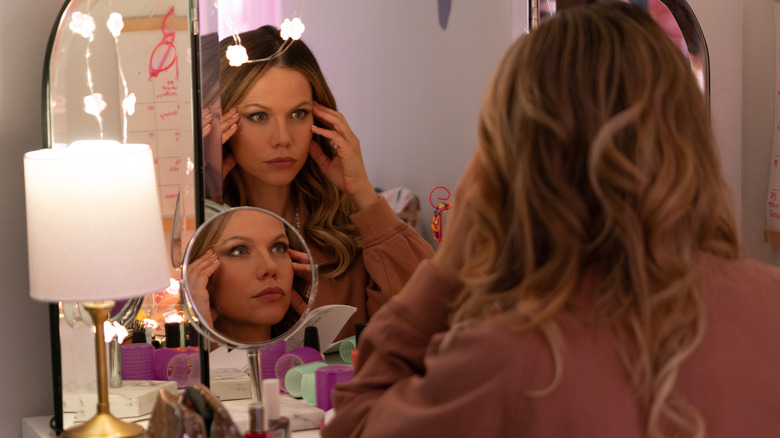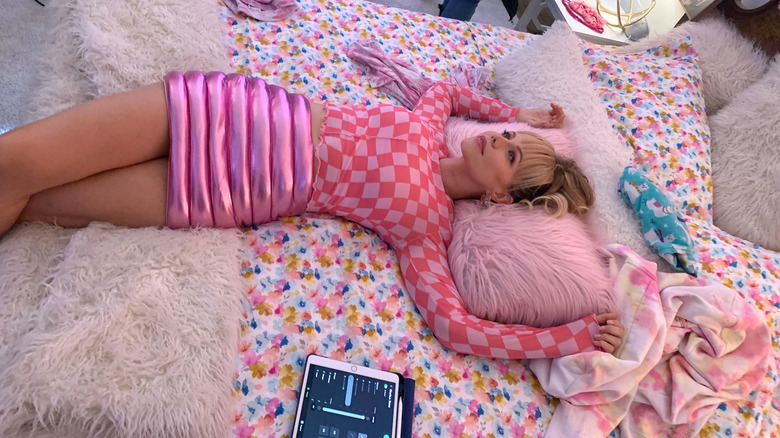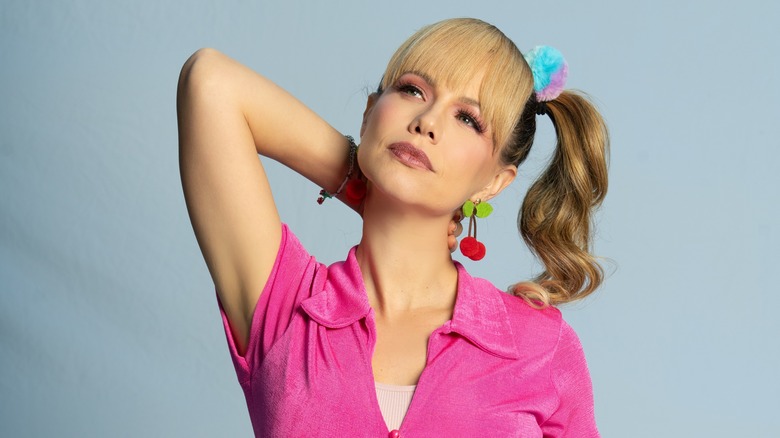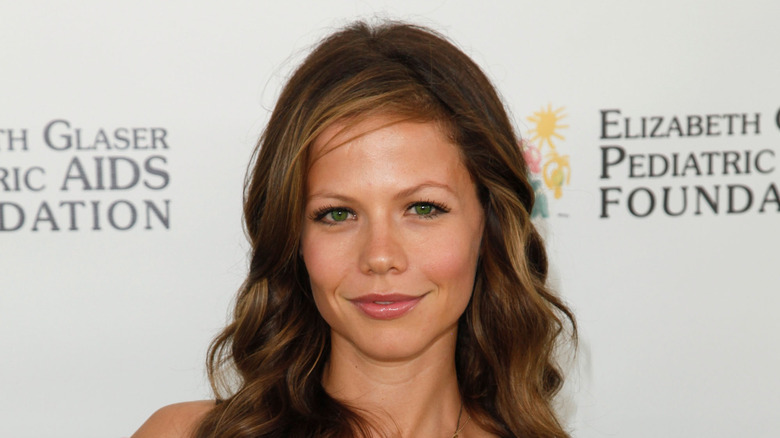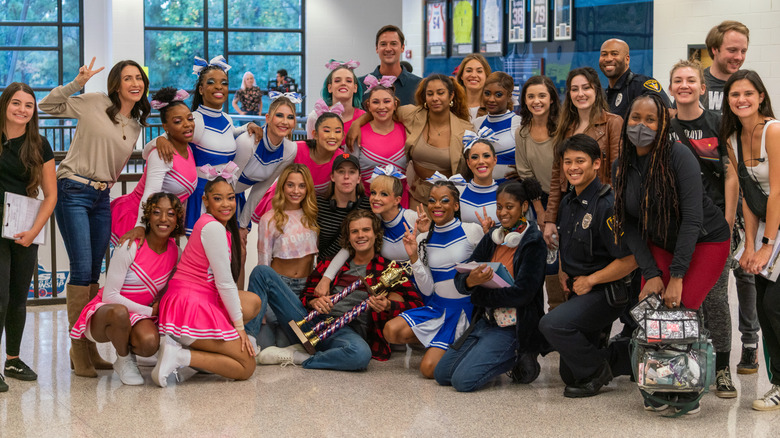Pretty Little Liars' Tammin Sursok On Blood, Sweat & Cheer And Her Podcast - Exclusive Interview
While perhaps best known for playing Jenna Marshall on the hit ABC drama "Pretty Little Liars" from 2010 to 2017, Emmy-nominated Tammin Sursok is involved in multiple facets of the entertainment industry. In addition to acting, she's a platinum-selling recording artist as well as a producer, writer, director, host, and content creator.
Born in South Africa and currently splitting her time between Tennessee and Australia, where she lives with her husband and two daughters, Sursok first made a name for herself by starring on the popular Australian soap opera "Home and Away" as well as the top-rated American soap "The Young and the Restless" before appearing in the 2009 film "Crossing Over" with Harrison Ford and Ray Liotta, followed by "Pretty Little Liars" and "Hannah Montana." Up next is her upcoming film "Blood, Sweat and Cheer," a dramatic thriller and dark comedy that premieres April 15 on Tubi.
The actress also hosts a celebrity interview series called "In Bed with Tammin" on her channel with Awesomeness TV and has released the latest season of the podcast she co-hosts called "Women On Top," a humorous look at life as a woman and mom that's garnered more than 2 million followers since 2019. The List had the chance to chat with the multi-talented star to talk about her new movie, her podcast, and more.
Her new movie pays homage to your favorite '90s flicks
Your new movie, "Blood, Sweat and Cheer," has been described as having "a '90s vibe meets '13 Going On 30' with a mother-daughter twist" that's "everything fun about cheerleading and high school wrapped up in a dark comedy." What can you tell us about the film?
Bad things happen at the end. It's like "Election," "Wild Things" ... It's a little bit of all of it, but it's very '90s filled. Some bad things happen. I kill a few people. I don't even know if I can say that. But it's the genre I love to play in. Throughout most of my career, I've either done comedy or drama, and to be able to blend the two together is awesome.
For a long time, because I played Jenna on "Pretty Little Liars," people thought I was just a dramatic actress, but I gravitate towards comedy even more than drama at times. It's nice to play that and confuse the audience a little bit because she's the anti-hero. You love to hate her, but that's all the characters I play. You don't want to like the character, but you end up liking her because — hopefully — there's an injection of authenticity and vulnerability that's threaded throughout the character.
What drew you to the project?
I've been lucky in my career since "Pretty Little Liars" with a lot of movies that are this type of model for Tubi or Netflix I've been offered. When you do get the offer, the first feeling is obviously feeling grateful that you get a job and that they picked you. You still have that mentality sometimes as an actress — that scarcity mentality that no one's ever going to give you a job, and you get excited that they did.
But it boils down to the script for me. In my early career, I probably said yes to projects just because I wanted to work. As I get older and hopefully more financially secure, you can start to make decisions based on whether you can give everything you know to this role. Like, "Am I willing to go there?" Because I don't ever want to do something in a half measure. I have to give it everything I've got. "Can I give that? Is it the right character for me to play, and is the script good?"
Again, back in the day, I just wanted to work. Now, I want to work with good people. Time is a commodity. I'm away from my kids when I leave for long periods of time.
But I read the script and I really liked it, and I hadn't been able to play a character like this ... Jenna has some vulnerability threaded throughout her as a person. Then I've done things like "Hannah Montana," which is over-the-top comedy. So it's like being able to do a little bit of both. I felt the script was solid — I lucked out with the director, Traci Hays, because she cared about this movie. When you do a movie that isn't as high-budget, sometimes people are just doing a job, but for her, it meant so much to make this movie great. For what we got to do in 15 days, we were able to do something pretty special.
The creativity of acting
What did you enjoy most about working on this film?
It was probably working with [Traci Hays], the director, but also ... that she trusted me enough to let me fly. A lot of the takes, I just went for it. I gave so many different versions of what was on the page and what I was able to play. I was able to get in a sense of flow, which you don't normally get ... She also trusted me to know my craft ... There are a lot of emotional scenes. I told her that, for those scenes, I'm my best first up and the first couple of shots. She worked with me to get the best performance, and you don't always get that on set. That was probably my favorite part.
Could you expand on getting into your flow when acting?
Yes — flow is a phenomenon [that] mainly happens in creative jobs, but also whenever ... you're so connected to the thing that's happening, because it's your purpose, that everything else completely goes away, turns black. You're so focused on something, and this euphoric feeling comes over you, where you don't even know what time is at that moment. You don't know how long you've been sitting there. It could be five minutes or three hours; you can't stop. You have to keep going because it feels so good. Flow, to me, is when you're in your state of purpose and nothing else matters ... I spend a lot of time trying to find it. That's the hard thing — because once you've experienced it, you spend your whole life trying to get there again.
You've spoken out on issues surrounding mental health and self-care, and you consider yourself a mental health advocate. Does this ever come into play when portraying a character?
Definitely. I have two daughters. One is 9, and one is 4, and I've been sitting with the idea of loss and that, every year, I lose a version of my daughter that she was the year before ... They grow into such different people every single year that I'm dealing with that sense of loss and how to let go. Biologically, Phoenix is an age where she has to start to move away from me. In the movie ["Blood, Sweat and Cheer"], I [thought], "What would that feel like if I had a daughter I love so much and I'm dealing with those emotions right now with loss and letting go, but I wasn't ...?" I've been through so much therapy in my life, so I've been able to work on my demons to be a better mom.
But imagine this character didn't get that support, didn't feel like she ever achieved anything or felt she was enough or had [reached] her true potential. What would it feel like if you grew up being told you were never going to equate to anything, and then you have a daughter who you love so much who's equating to everything, and then you have to let them go into the world? Playing with those themes and those ideas was interesting to me. I know what it's like to feel like I'm losing my children emotionally, and that's a hard one to wrestle with. I knew I was going to have to go there for this film. I don't do things half-measured, so I knew it wasn't going to feel good.
The new season of Women on Top
You also have your podcast, "Women on Top," that you've co-hosted since 2019.
We have Alicia Silverstone coming on. We have Rachel Bilson coming on, Naomi Watts. Ali Fedotowsky-Manno ... We had Meghan King with "Housewives." We've got Heather Dubrow coming on. She's talking about her children. A lot of them are in the LGBT community. Going to be talking about that coming up ... It's grown into something pretty special.
Are there any guests or interviews you were particularly excited about or that especially stood out to you?
You never know what you're going to get with a podcast. I'm sure you feel the same with an interview. Sometimes the ones that you don't think are going to surprise you really do. A lot of the reality stars are willing to go down and get vulnerable because it's their job, [but] I feel like as actresses and actors, a lot of us have been taught to give packaged vulnerability because you've got to be careful about how the media spins your words, so it's hard to get down to the core of what makes people tick. But I believe that our show ... is such a safe place for women ...
We're the type of podcast that gives the show to each guest so they can choose if there's something that they don't feel comfortable with or [how] their words are spun. Because it's such a safe space, we have some meaningful, vulnerable conversations. People have opened up on our podcast and said things they've never said before about things they're struggling with or that they're scared of. It's actually changed me. I hope [that for] people who listen to it, [that] it's changed them, but it's actually changed me far more than the people who listen.
Advocating for women and mental health
You're also a champion for women on your podcast. Was there a particular situation in your life that propelled you to stand up?
[I] had a very typical upbringing. My dad used to work, my mom took care of us ... My mom was a very successful singer and director in South Africa, and we immigrated, and she never got to become the woman that I knew she wanted to be. Witnessing that and knowing [that] ... She definitely loved us so much, and she still loves my dad. They're still together, but I feel like there's a sense of subconscious sadness that she never got to fight for her dreams and fight for her goals. I never want my children to feel that. I have two little girls. I don't know if there's ever one moment to say was the moment I decided to fight for female rights and be a feminist, but it's really that I witnessed my mom not pursuing her dreams.
Then, my children, I've got two girls — and I've been working since I was 14 years old. I was a child actor, and I've seen on set the inequality of women not being paid as much as men. When we speak and raise our voices on set or wherever, whatever workplace, it's not taken as seriously. I've always felt like women are a little bit of the underdog. It's important for there to be more positions in power that are female, so the gatekeepers are helping other women.
I also think it's important to talk about the fact that I don't fully believe that women support women. We have been taught to pit ourselves against each other because there are not enough spots. A lot of us live in a scarcity mindset of, "If she gets my job, there's not that many more." Some of that is actually true — there aren't that many spots for females, so I get how you're trying to claw over people to succeed. But I do believe [that] ... when women come together and they're a community, wonderful change can happen. I have received so much from my real, deep female friendships that I could never get from anywhere else, and I appreciate women, and we need to have each other's backs.
Personal and professional goals and other upcoming projects
You have many different talents, from acting to producing, directing, and writing — even singing and, of course, hosting and creating content. Which do you enjoy the most or is your first love?
Acting is my first love. It's what I've been doing for the last 22 years. I don't get to be in that sense of flow when it comes to acting much [because of] the nature of our business — you have to get cast, you have to be on set, a lot of stop, start. So acting is my first love, but a close second is directing. My mom was a director in South Africa. I love moving pictures. I love photography, the photographic element to making movies. I love working with people.
So [it's] definitely that first, but again, it's all intertwined. My content, my platforms, are a way to create as well, whether it's funny videos or videos that make you think or speaking up about subjects that matter. It's all in the same realm. My purpose is to entertain people and make them feel less alone, speak for people who don't speak, and give space for people who don't have that space. That's my purpose.
What else might you want to conquer that you have yet to?
Some personal side enjoyments I have. I love photography. I'd love to have a photographic showing. I'd love to get more into my art. I would love to direct more. I'd like to go on tour with my podcast to all different cities — hopefully make the show worldwide, but as of now, probably Australia and the U.S.
I'd like to have another baby, but I don't know if my husband's on board with that ... and probably spend more time with my family. I don't know if it's a goal, but my family's in Australia, and there's a lot going on in the U.S. right now that it's important for me to fight the fight, but I also feel it's important for me to protect my children in the way that I know I can. It's a hard thing. For me, it's this middle ground of protection and providing, and what does that look like? I feel like I could protect them better in Australia. I feel like I could provide for them more in America. It's trying to find some kind of middle ground where everyone feels safe.
What other projects do you have in the works?
You can always watch "Pretty Little Liars" on HBO right now. It got sold again, so it's definitely still out there, which is awesome. I have a ton of movies still replaying. I'm shooting two movies in New Zealand in June ... I have another movie I just shot in Canada called "Stolen Memories" that is a totally different character. I have a stroke, and I can't remember all these things that have happened to me, and then my past starts coming back into my life, and it's a very scary place to be. I kill people, too, in that. I kill a lot of people in these movies. But that should be somewhere soon — I'm excited.
"Blood, Sweat, and Cheer," inspired by real events, premieres April 15 on Tubi. Tammin's podcast, "Women on Top," is also back for a new season.
This interview has been edited for clarity.
